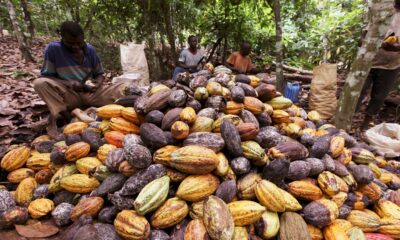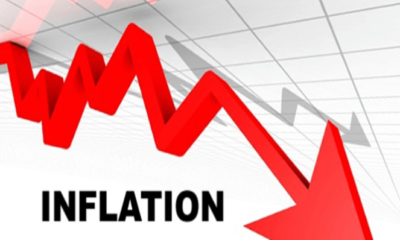Strictly Personal
Killing the game: Media ownership in Ghana by Kwame Adinkrah
Published
2 years agoon
It is often contended that, like the firearm, the media is both a tool and a weapon; a tool because it functions as a means of communication, a weapon because it has the tendency to mislead and incite.
Experts say media set the stage by spreading animosity against ethnic gatherings in Rwanda that caused the Rwandan ethnic conflicts.
Ironically, in the context of acquiring a firearm many countries have put in place restrictive measures to assess the owner and the intended reason for its possession.
Over the years, Ghana has built a number of legislations to curtail and clip the citizens’ right to keep and bear arms. A person qualified to acquire firearm should be mentally sound, physically fit and must be of good character and without criminal traits or records.
However, same cannot be said when seeking an authorization to operate a radio spectrum in Ghana.
The National Communication Authority (NCA) is a government agency under the Ministry of Communication with the mandate to regulate spectrum for and on behalf of the people of Ghana.
The agency has an additional mandate to auction frequencies to companies to render services as corporate business entities to generate revenue and make profits.
Among the guidelines required by the NCA is the submission of Programming Philosophy to indicate the nature of programming the station intends to churn out.
This requirement alone, however, cannot exonerate potential investors to pursue political agenda or other dangerous interests.
Across the world, political organizations and leaders use and/or abuse media for their own political aspirations.
Similarly, media owners use their media to promote and disseminate their own political views, and exploit politicians to achieve their own (corporate) goals.
Very recently, a renowned entrepreneur in Ghana, Dr. Sam Jonah in a speech to the Rotary Club indicated that “Our media landscape is so polarised and partisan.
There is hardly any objectivity because a lot of the media stations are owned by politicians whose interest is in swaying voters one way or the other. Independent media practice seems to have faded and journalism has become a conveyor belt for political propaganda, insults, and acrimony.”
Scholars, however, tend to find problems with all forms of media ownership.
According to Picard and Dal Zotto in 2016, private ownership is problematic because proprietors can use it for private interest; corporate ownership can put profit goals ahead of social goals; public service media can present limited choice and are prevented from pursuing political agendas; big companies can control content and markets; small companies cannot provide the proper range of quality and content, and they are weak in the face of pressures from powerful interests; foreign owners can bring in foreign influences that can affect national sovereignty; and domestic owners are often too close to domestic social and political power. Hence, all forms of ownership come with their own set of advantages and disadvantages.
It is, also, argued that the many of the complaints we have today in Ghana about ownership have nothing to do with ownership per se, rather the over commercialized nature of media in pursuit of economic rewards. Politically, to win and sustain political power.
Prof. Kwame Karikari, Executive Director of Media Foundation for West Africa has described as dangerous the situation where politicians were constantly owning media houses in Ghana and throwing ethics and professionalism to the wind.
In his book “Les nouveaux chiens de garde,” Serge Halimiasks whether it is possible to imagine someone buying an instrument that offers the prospect of influence, but foregoing the chance of influencing the orientation of such an instrument?
The Ghanaian media is practically owned and controlled by politicians and entrepreneurs with political affiliations. There is no ambiguity to that fact. On the corridors of NCA the rumours are rift that ‘if you do not have strong political connection, you will not have a frequency’. In other words, if you are not a member of an existing regime it is impossible for NCA to issue you a spectrum.
There is no conspiracy theory needed for the analysis of media deviations in Ghana today.
The traditional roles of radio or the media; to inform, educate and entertain have today become commercial tools auctioned to the highest bidder. These tenants are now utilized as weapons by politicians to incite a section of the populace, propagate their party views and create an atmosphere of uncertainty.
Radio is no longer exciting as it used to be in the 90s where the airways would be filled with good music, high quality presentation and matured news. Today, what we hear on radio could be likened to fragmented noise with unsubstantiated reports and vilification of people.
All radio morning shows have become political shows or politically induced shows. The shows have been crafted to propagate the views of political parties and avenues of setting political agenda.
Every social subject discussed on radio has its own political dimension; every policy is discussed along political lines. Sadly, some journalists are becoming more politicians than the politicians themselves.
But according to Professor Kwame Karikari, radio today is as indispensable to the existence, cohesion and development of modem society as oxygen is to the survival of living beings.
It is therefore, imperative that there should be a concerted effort to properly regulate and protect the media space for posterity.
The National Media Commission is struggling on legal interpretation of its mandate to ensure highest journalistic standards.
The Chairman, Yaw Boadu-Ayeboafoh is on record to have said that the commission cannot regulate contents of media houses and that the commission can only go as far as the documented ethics that has no legal backing.
The Ghana Journalists Association is hanging on code of conducts for their members. A set of codes that is not a legal prerequisite of establishing a radio station.
The Ghana Independent Broadcasting Association is an association of independent broadcasters that can only appeal to members with sanctions not deterring enough to ban offenders from operating.
The Ghanaian media space has become exclusively profit generating enterprise and highly politicized in direct contrast with journalistic requirements of objectivity and diversity.
Stricter laws and regulations, monitoring and sanctions from the NCA and NMC can save the media space.
You may like
-


Bean disease affects 81% of major cocoa region in Ghana
-


Ghana: Inflation decreases to 22.8%
-


Mohammed Kudus promotes Ghanaian jollof during West Ham pre-season training
-


Ghana’s Energy Minister Prempeh selected as Bawumia’s presidential running mate
-


University of Ghana hosts exhibition on slavery at Elmina Castle
-


Ghanaian star Kudus in new ad for footwear makers Skechers along with Kane, Zinchenko, Elanga (Video)
Strictly Personal
All eyes in Africa are on Kenya’s bid for a reset, By Joachim Buwembo
Published
5 days agoon
July 21, 2024
Whoever impregnated Angela Rayner and caused her to drop out of school at the tender age of 16 with no qualifications might be disappointed that we aren’t asking who her baba mtoto (child’s father) is; whether he became a president, king or a vagabond somewhere, since the girl ‘whose leg he broke’ is now UK’s second most powerful person, 28 years since he ‘stole her goat’.
Angela’s rise to such heights after the adversity should be a lesson to countries which, six decades after independence, still have millions of citizens wallowing in poverty and denied basic human dignity, while the elite shamelessly flaunt obscene luxury on their hungry, twisted faces.
After independence, African countries also suffered their adolescent setbacks in the form of military coups. Uganda’s military rule lasted eight years, Kenya’s about eight hours on August 1, 1982, while Tanzania’s didn’t materialise and its first defence chief became an ambassador somewhere.
What we learn from Angela Rayner is that when you’re derailed, it doesn’t matter who derailed you, because nobody wants to know. What matters is that you pick yourself up, not just to march on, but to stand up and shine.To incessantly blame our colonial and slave-trading ‘derailers’ while we treat our fellow citizens worse than the colonialists did only invites the world to laugh. Have you ever read of a colonial officer demanding a bribe from a local before providing the service due?
African countries today need to press ‘reset’. A state operates by written policies, plans, strategies and prescribed penalties with gazetted prisons for those who break the rules. This is far more power than teenage Angela had, so a reset state should take less time to become prosperous than the 28 years it took her to get to the top after derailing.
So it’s realistic for countries to operate on five-year planning and electoral cycles, so a state that fails to implement a programme in five years has something wrong with it. It needs a reset.
A basic reset course for African leaders and economists should include:
1. Mindset change: Albert Einstein teaches us that no problem can be solved from the same level of consciousness that created it. For example, if you are in debt, seeking or accepting more debt is using the same level of thinking that put you there. If you don’t like Einstein’s genius, you can even try an animal in the bush that falls into a hole and stops digging. Our economists are certainly better than a beast in the bush.
2. Stealing is wrong: African leaders and civil servants need to revisit their catechism or madarasa – stealing public resources is as immoral as rape.
3. Justifying wrong doesn’t make it right: Using legalese and putting sinful benefits in the budget is immoral and can incite the deprived to destroy everything.
4. Take inventory of your resources and plan to use them: If Kenya, for example, has a railway line running from Mombasa to Nairobi, is it prudent to borrow $3.6 billion to build a highway parallel to it before paying off and electrifying the railway?
If Uganda is groaning under a $2 billion annual petrol import bill, does it make sense to beg Kenya for access to import more fuel, when Kampala is already manufacturing and marketing electric buses, while failing to use hundreds of megawatts it generates, yet the country has to pay for the unused power?
If Tanzania… okay, TZ has entered the 21st Century with its electric trains soon to be operating between Dar es Salaam and Morogoro. Ethiopia, too, has connected Addis Ababa to the port of Djibouti with a 753-kilometre electric railway, and moves hundreds of thousands of passengers in Addis every day by electric train.
5. Protect the environment: We don’t own it, we borrowed it from our parents to preserve it for our children. Who doesn’t know that the future of the planet is at stake?
6. Do monitoring and evaluation: Otherwise you may keep doing the same thing that does not work and hope for better results, as a sage defined lunacy.
7. Don’t blame the victims of your incompetence: This is basic fairness.
We could go on, but how boring! Who doesn’t know these mundane points? We are not holding our breath for Angela’s performance, because if she fails, she will be easily replaced. Africa’s eyes should now be on Kenya to see how they manage an abrupt change without the mass bloodshed that often accompanies revolutions.
Strictly Personal
The post-budget crisis in Kenya might be good for Africa, after all, By Joachim Buwembo
Published
2 weeks agoon
July 10, 2024
The surging crisis that is being witnessed in Kenya could end up being a good thing for Africa if the regional leaders could step back and examine the situation clinically with cool-headed interest. Maybe there is a hand of God in the whole affair. For, how do explain the flare not having started in harder-pressed countries such as Zambia, Mozambique and Ghana?
As fate would have it, it happened in East Africa, the region that is supposed to provide the next leadership of the African Union Commission, in a process that is about to start. And, what is the most serious crisis looming on Africa’s horizon? It is Debt of course.
Even the UN has warned the entire world that Africa’s debt situation is now a crisis. As at now, three or four countries are not facing debt trouble — and that is only for now.
There is one country, though, that is virtually debt-free, having just been freed from debt due to circumstances: Somalia. And it is the newest member of the East African Community. Somalia has recently had virtually all its foreign debt written off in recognition of the challenges it has been facing in nearly four decades.
Why is this important? Because debt is the choicest weapon of neocolonialists. There is no sweeter way to steal wealth than to have its owners deliver it to you, begging you, on all fours, to take it away from them, as you quietly thank the devil, who has impaired their judgement to think that you are their saviour.
So?
So, the economic integration Africa has embarked on will, over the next five or so years, go through are a make-or-break stage, and it must be led by a member that is debt-free. For, there is no surer weapon to subjugate and control a society than through debt.
A government or a country’s political leadership can talk tough and big until their creditor whispers something then the lion suddenly becomes a sheep. Positions agreed on earlier with comrades are sheepishly abandoned. Scheduled official trips get inexplicably cancelled.
Debt is that bad. In African capitals, presidents have received calls from Washington, Paris or London to cancel trips and they did, so because of debt vulnerability.
In our villages, men have lost wives to guys they hate most because of debt. At the state level, governments have lost command over their own institutions because of debt. The management of Africa’s economic transition, as may be agreed upon jointly by the continental leaders, needs to be implemented by a member without crippling foreign debt so they do not get instructions from elsewhere.
The other related threat to African states is armed conflict, often internal and not interstate. Somalia has been going through this for decades and it is to the credit of African intervention that statehood was restored to the country.
This is the biggest prize Africa has won since it defeated colonialism in (mostly) the 1960s decade. The product is the new Somalia and, to restore all other countries’ hope, the newly restored state should play a lead role in spreading stability and confidence across Africa.
One day, South Sudan, too, should qualify to play a lead role on the continent.
What has been happening in Kenya can happen in any other African country. And it can be worse. We have seen once promising countries with strong economies and armies, such as Libya, being ravaged into near-Stone Age in a very short time. Angry, youthful energy can be destructive, and opportunistic neocolonialists can make it inadvertently facilitate their intentions.
Containing prolonged or repetitive civil uprisings can be economically draining, both directly in deploying security forces and also by paralysing economic activity.
African countries also need to become one another’s economic insurance. By jointly managing trade routes with their transport infrastructure, energy sources and electricity distribution grids, and generally pursuing coordinated industrialisation strategies in observance of regional and national comparative advantages, they will sooner than later reduce insecurity, even as the borders remain porous.
EDITOR’S PICK


Trevor Noah set for ‘Off the Record’ world tour
South African comedian and talk show host, Trevor Noah, has announced a date for his “Off The Record” global tour...


SA mobility startup LULA acquires UK-based Zeelo’s operations
South Africa’s mobility startup, LULA, has announced the acquisition of the operations of UK-based Zeelo in a move that will...


Ngannou accuses Joshua of employing dirty tactics in their fight in Saudi Arabia
Former UFC heavyweight champion, Francis Ngannou, has accused British-Nigerian boxer, Anthony Joshua, and his promotion team of employing unfair and...


#EndBadGovernance Protests: Please be patient with Tinubu’s govt, monarchs beg Nigerian youths
Some prominent traditional rulers in Nigeria have pleaded with Nigerian youths and organizers of the planned nationwide #EndBadGovernance protests scheduled...


UNESCO removes Senegal’s Niokolo-Koba National Park from list of World Heritage sites in danger
The United Nations’ Educational, Scientific and Cultural Organization (UNESCO) has removed Senegal’s Niokolo-Koba National Park from the list of World...


At Project Aliyense discourse, panelists call for balance between free speech, ethical considerations
The government has been urged to balance freedom of speech with ethical considerations and laws that prevent harm to others....


Adenia Partners acquires Air Liquide’s operations in 12 African countries
Adenia Partners, a leading private equity firm, has completed the acquisition of Air Liquide’s operations in 12 African countries, adopting...


We will handle planned nationwide protests as family matter— Nigerian Govt
The Nigerian government says it will handle the planned #EndBadGovernance protests scheduled to commence on August 1 as a family...


Veteran Nigerian entertainer Charly Boy vows to divorce wife if Kamala Harris doesn’t win US presidential election
Veteran Nigerian entertainer, Charles Oputa, popularly known as Charly Boy, has vowed to divorce his wife of 47 years if...


Saudi club Al Hilal places African transfer record bid for Osimhen
Saudi Arabia club side, Al-Hilal, have reportedly made an African transfer record bid for Super Eagles and Napoli striker, Victor...
Trending
-

 Sports1 day ago
Sports1 day agoMeet Nigerian-born players doing big things for Japan at Paris 2024 Olympics
-

 Metro1 day ago
Metro1 day agoWe will handle planned nationwide protests as family matter— Nigerian Govt
-

 Metro14 hours ago
Metro14 hours ago#EndBadGovernance Protests: Please be patient with Tinubu’s govt, monarchs beg Nigerian youths
-

 Tech1 day ago
Tech1 day agoAdenia Partners acquires Air Liquide’s operations in 12 African countries


